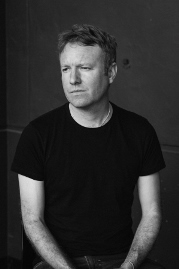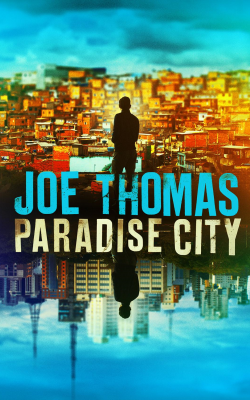 I lived
in São Paulo for almost ten years, but it wasn’t until I came back to London
that I started to write about the city.
I lived
in São Paulo for almost ten years, but it wasn’t until I came back to London
that I started to write about the city.
The
vibrancy, excitement, the daily grind of traffic and pollution, the vast,
sprawling, hotheaded, concrete megalopolis seemed to me a fine subject for a
novel. I wanted to make sense of the place, of my experience there, and it
feels like I needed the remove of returning home. But how to tell the story of
a city? Crime fiction is a perfect vehicle as it unites all levels of society,
from the favela drug dealers, to the
highest level politicians. You can strip away the layers of city in a crime
narrative.
And as
I thought about a way in, I realised I did not have to look very far for
inspiration.
*
One
thing about living in São Paulo is how quickly you get used to the
normalisation of crime, the threat of crime. Driving is a good place to
illustrate this: the winding up of your car windows when you stop; the jumping
of red lights after a certain time of night; the constant checking that your
doors are locked. It became clear to me that preparing for crime, or its
prevention is the same thing as living with its threat; one way or another, it
very quickly becomes a mundane part of your daily life. Everyone knows someone
who has suffered some terrible experience.
São
Paulo exists in a state of heightened paranoia that lends itself to massive gun
ownership, distrust of the police, and armies of private security. Drive around
any relatively wealthy area and you’ll find high walls ringed with barbed wire,
doormen, security teams, and CCTV everywhere.
My own
building has a clever little routine. When you drive into the garage, you must
identify yourself at the bulletproof glass booth in which three or four of the seguranças
sit. These guys are lovely and do more than just security. They run the
building, taking barbeque bookings, organising events, helping with shopping
and storage. However, they do do security. And car-jacking in Morumbi does
happen. Here’s how:
A pair
of thieves stops you at a traffic light, one hops in the back with a gun
trained on your head. When you approach your building, they crouch down low and
tell you they’ll kill you if you do anything suspicious. So you wave
nonchalantly at the glass booth and ghost inside. Then, the thieves go from
flat to flat stripping them of valuables, load up, and leave in the car in
which they arrived.
It’s a
clever scam, if a little high-risk. So, in our building there is a system. If
you do happen to drive in with a couple of malandros hidden in the back, you’re
supposed to (calmly) park in a special bay which the security guys have
designated as a signal to them that you’re in trouble. Once parked there, I
don’t dare think what happens next. I never even bother to find out which bay
is designated as the signal. I live more in fear of parking in it by accident
and being forcefully ‘rescued’ by the seguranças, than I do of an actual
car-jacking.
*
Gringa begins with a brutal
interrogation and a murder; Paradise City
opens with a bala perdida, a
stray bullet. They’re more common than you might think.
Meet
Bambino.
He’s
one of the older men in the condominium where I live; he’s especially loud –
burly, burned deep red, fifty-ish – and works in fashion. He likes to shock the
wives of his friends and is an outrageous and insistent flirt. Outrageous in
what he considers flirting to be – insulting women and then telling them he
wants to sleep with them – and insistent in that no amount of discouragement
will ever change this approach. He’s of Italian origin, but that’s not why he’s
called Bambino. He’s called Bambino because that’s what he calls everyone else.
There
is an interesting contradiction at the heart of his character. Despite his
upper body bulk, bulbous drinker’s nose, thinning slicked back hair and skinny
legs – in his unnecessarily tight trunks he resembles a hirsute Mr Toad – he
floats about on the tennis court like Stefan Edberg, a natural talent unmatched
by anyone else in the building. They all arrive at the court with racket bags,
matching dri-fit shirts and shorts, expensive trainers, isotonic drinks.
Bambino turns up in plimsolls, flowery swimming shorts – at once too baggy and
too high – a vest, and carrying a heavy, grip-frayed racquet that might have
been cutting edge in the late 1970’s. When I watch his drop volleys, sliced
overheads, feints and angles, I always think that God must be playing some sort
of joke: how could a man who so delights in vulgarity have so much grace?
There
is a moment of epiphany and I suddenly understand properly something Bambino
has been telling me almost every weekend morning since I’ve known him.
He
leans close and whispers – loudly, so everyone can hear, ‘Pegei uma puta
gostosa ontem’.
This, I
originally thought meant, ‘I pulled a super hot woman last night’, and while I
find it unlikely given his questionable looks and charm, he does have a certain
something, so I smile and say the Brazilian equivalent of, ‘Nice one, Cyril.’
This,
though, is a grammatical issue. The word puta translates as whore but it also
serves an intensifier, e.g. ‘That was puta cool!’ ‘It is puta hot today in the
sun.’ Gostosa can be both slightly coarse adjective (essentially ‘sexy’) and
also noun (woman who is sexy). Naively, I believe that Bambino is using
intensifier and noun. Turns out not. He is, in fact, using noun and adjective.
So, for about five years, he’s been telling me stories about what I believed to
be a series of interesting girlfriends. But weren’t.
And
then Bambino is shot in the chest.
When he
gets out of hospital I see him sitting by the pool in customary fashion,
Speedos and lager. A little quieter, a little recalcitrant even, but basically
the same. There are a group of friends and well-wishers surrounding him and he
knocks them aside to embrace me.
‘Feel
this,’ he says, taking my hand up to his chest.
Steady
on, I think and then realise what he is doing.
‘It’s still
there. Can you feel it? The bullet.’
I can.
It is hard and lumpy like a growth. If you push firmly, you can trace the
edges. It’s like someone has forced a bottle cap under his skin.
‘They
weren’t able to take it out,’ he says, ‘without causing further problems. So.’
He
laughs. Raises his can of lager.
‘What
doesn’t kill you, eh?’ and blows a kiss at Selina, an attractive, kind woman
who, mysteriously, has always put up with him, sunbathing near by and
tut-tutting in mock consternation at his jokes and stories.
Everyone
laughs and shakes their heads. Bambino.
He was
hit by a bala perdida, a stray bullet. 9am and Bambino had been walking to work
in Itaim, a respectable and desirable area of offices and residences, quiet
streets and fashionable restaurants. Shots were fired; he felt his legs give
way and warmth in his chest. His head spun and there was a sharp and nagging
pain in his back. When he looked up, he saw his dead father talking to God.
That’s the last thing he remembered before coming round in hospital.
He’s
fine now, the bullet worn like a badge of honour, a greying lump of skin that
doesn’t tan like the rest of him.
Thing
is, I’ve been hearing rumours that it wasn’t a stray bullet at all.
*
Not
long after this incident, one lunchtime at the British school where I work, I
try to pop to the bank. The security guard stops me. No one is allowed out.
Turns
out, the bank has been robbed about half an hour earlier and the two crooks are
hiding somewhere in the neighbourhood. This is a posh neighbourhood, with
spacious houses, foreign cars and private security booths on most corners.
Later, I discover that the police only manage to catch one of the thieves. The
other is shot dead by a student’s bodyguard. He was waiting around outside the
school and noticed someone suspicious, pursued him, realised who it was and
killed him. Shot him in the chest and head. A very professional job.
No one
cares.
Most
Paulistanos shrug it off, click their teeth and say:
‘Ah,
menos um, ne?’ ‘Oh well, that’s one less, right?’
Normalisation.
*
In both
my novels, the favela Paraisópolis –
Paradise City – features prominently. I lived very close to it, in Morumbi. About a third of the city’s population
live in a favela, or slum, and are known as favelados. Favelas are
self-sufficient communities of low-paid workers who cannot afford decent
housing in a society that, unlike the UK, doesn’t provide social housing. Favelados
suffer extraordinary prejudice, mainly due to the fact that criminal gangs and
drug dealers have, historically, run the favelas. In 2012, the military police
went into Paraisópolis – Operação Saturação – in an attempt to wipe out the
drug problem through saturating the favela with a police presence, leaving
hundreds for dead. This is a key theme of my novel Paradise City. It’s not just the drug dealers who suffer. Ordinary
kids are caught in the crossfire by lost or stray bullets. Most of the time the
favela is peaceful. The reality is of struggle and survival. The curse of
poverty remains and, what shocks, is that I often think there are plenty of
people in São Paulo who want to keep the favelados in this poverty trap. The
most common occupation for women in Brazil’s favelas remains in domestic
service, working as maids.
One
Tuesday night, during the school holidays, I do something rash. I’ve been
playing tennis and then head to the condominium bar to drink, eat a sandwich
and read, when I am joined by Julião, a large, bald man in his fifties known
for his prodigious capacity for alcohol. He looks like a cross between Shrek
and Big Daddy. He is a good man with a good heart, but when drunk…let’s just
say I’ve seen him in the early mornings
when I went down to the garage to drive to work, padding about barefoot with a
can of lager, chatting to the seguranças, telling stories.
We talk
and he quickly nails two or three bottles of beer – the tall, 600 ml type that you’d
normally share. He tells a succession of filthy jokes and I try to keep up with
his slurred and coarse Portuguese. At closing time, he wanders with me towards
the lift.
‘Let’s
go to the favela?’ he says.
‘Why?’
I ask, not really wanting to know the answer.
‘Another
drink. I know people.’
I’m not
sure. Middle class Brazilians have a deep distrust and fear of the favelas,
especially, and not unreasonably, for me as a gringo.
Julião’s
little excursions are well known and other friends of mine have been with him,
vowing never again. But before I really know what I’m doing, I’m jumping into
the passenger seat of his car and we stutter and shunt down the hill into
Paraisópolis.
We’re
in a tiny, poorly-lit street with a shop-front bar, mosquitoes buzzing around
naked bulbs, crates of empty bottles of beer stacked up in the street. A couple
of sullen looking men sit at rusting, beer-brand tables, not talking, raising
their bottles and glasses of cachaça to the owner. They greet Julião with nods
and look at me with undisguised surprise. I don’t fit in here. I have no idea
where I am. I’ve driven through the favela once before, taking a short cut to
work at seven o’clock in the morning and even then the maze – the warren – was
confusing. Hills dip up and down, the houses lurching out at odd angles, lines
of washing strung across the streets. Each house looks different, but the same.
The same rough brick and corrugated iron, the same painted on house number, the
same noises echoing out from the hollow walls, the same thick smells hanging in
the heat like clouds.
The
point about a favela is that you are in it. It’s a separate place from the
city, a community, yes, but an alien one. There aren’t too many pale, reddened
faces here.
We sit
and Julião orders drinks. I am tense, my legs shaking, though everyone who
passes seems to know him and he introduces me as O Gringão, The Big Gringo. It
seems to satisfy them. I don’t have my wallet, just some loose change and I
wonder if that is a good or bad thing. I want to trust Julião, but you never
know with him – he’s created his own myth, and I can’t be sure how much of it
is fiction.
After
what feels like an extremely long time (measured by two beers between us) a
group of very young women saunters by. They stop to talk to Julião and he makes
them laugh, though I realise he is being pretty provocative. They examine me
like an exhibit and raise their eyebrows, suck their teeth, slap hands. I find
out later that they are prostitutes who come to dance Samba in the little,
grotty garage bar opposite the condominium on Saturday afternoons. One nice
thing about Julião – he doesn’t judge and will befriend anyone. A few young men
in shorts and flip-flops pass by, calling out to the owner. They look a little
more hostile. I try to reason with myself. Just how much influence does an old
drunk really have? They eye me a little. I’m saying nothing, drinking too
quickly to compensate. I tell Julião I need to leave, make something up about
having an early start. It is already past two o’clock. He grunts something
about a saideira, one for the road, but I know that he rarely just has one. I
ask about a taxi and he laughs.
‘I’m
not letting you go off on your own,’ he says.
I’m not
reassured.
Another
beer is ordered.
The
young men are joking and laughing at something. I hope it isn’t me, but I can’t
be sure. They’re speaking in a rough slang much of which I don’t understand.
And I’m trying not to listen too carefully anyway. I’m trying to sink into the
background, but it’s a bit like hiding a glowing light bulb under a thin sheet.
There
is a light breeze. It’s that rare thing in São Paulo when the heat finally
dissipates and the freshness is cool and comforting, like the dusk in summer in
England. Here, you have to be up in the middle of the night to feel it. The
houses that bend over us in the tight street, their irregular shapes jutting
out at odd angles, corrugated extensions hanging low, seem to sway with the
wind. There is a low, constant crackle of electricity in the wires strung
criss-crossed above us, straining to carry the current around the Paraisópolis
labyrinth.
The
girls amble down the street and the young men swagger behind, laughing at them,
flip-flops slapping on the bumpy road. I look at Julião. He smiles and punches
me on the shoulder, kisses me on the forehead.
‘Embora,’
he grunts. Let’s go.
We
throw some money on the table and there is a tense moment as Julião does a
round of goodbyes at the bar, each one taking a little longer than I’d like. I
stand awkwardly grinning, nod my own goodbyes. Julião’s car staggers up the
road and into the condominium garage, and I pray he doesn’t park in the
designated security bay.
 Published by Arcadia Books, Feb 15 2018 Hardback £14.99
Published by Arcadia Books, Feb 15 2018 Hardback £14.99
Read SHOTS' review by LJ Hurst here
 Published by Arcadia Books, Feb 16 2017 Hardback £14.99
Published by Arcadia Books, Feb 16 2017 Hardback £14.99
Read SHOTS' review by Michael Jecks here